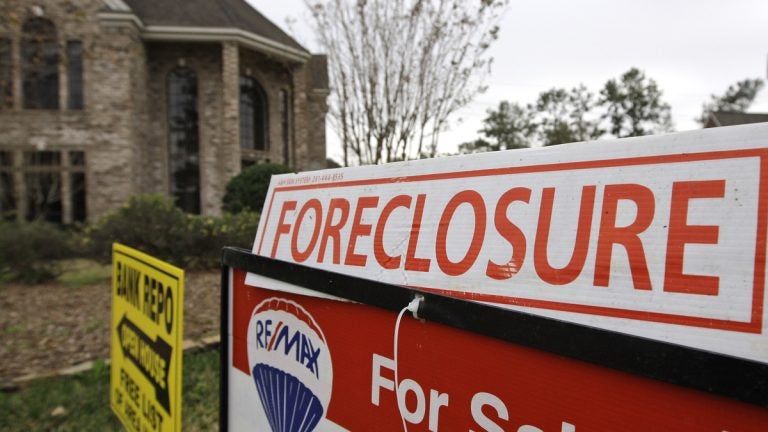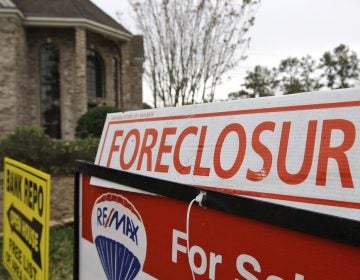Trenton tackles N.J.’s foreclosure rate, down but still highest in nation
According to New Jersey state officials, there are 20,000 active foreclosure cases currently making their way through the courts.

According to New Jersey state officials, there are 20,000 active foreclosure cases currently making their way through the courts. (David J. Phillip/AP Photo)
This story originally appeared on NJ Spotlight.
—
New Jersey, which has struggled with a high foreclosure rate since the Great Recession, continues to lead the nation in foreclosures. Hoping to solve this problem, lawmakers sent Gov. Phil Murphy a package of bills they say will keep more property owners in their homes, shorten the amount of time a house sits vacant and prevent vacant properties from becoming eyesores.
New Jersey had more than double the national rate of foreclosures again last month, with Realty Trac reporting one of every 1,006 homes in some stage of the process — pre-foreclosure, up for auction or bank-owned. The national rate was one in 2,471 mortgages. Though highest in the nation, the rate in New Jersey was 6 percent lower in February than in January and 24 percent lower than a year ago.
Realty Trac’s numbers don’t “reflect the time it takes for the judicial foreclosure process to be completed,” said MaryAnn Spoto, a spokeswoman for the New Jersey judiciary.
Foreclosure — balancing the rights of delinquent property owners with those of the banks that hold mortgages and servicers that process payments — is a judicial process in New Jersey. Thus, it can take longer than in those states where the courts do not get involved.
Over the last several years, New Jersey’s courts have reduced the foreclosure backlog and shortened the time it takes to clear cases. According to Spoto, the number of active foreclosure cases in the state has been cut by 85 percent since 2011. She said the state currently has about 20,000 active cases, which is about the number it had prior to the financial crisis.
Help in resolving a persistent backlog
Still, a special judiciary committee last September said the legislation was necessary to tackle some aspects of the problem. And on Monday, both houses of the Legislature passed a bipartisan package of bills, which have the support of community housing developers, implementing the committee’s recommendations. The measures attack the state’s stubborn foreclosure problem from multiple angles.
“The package of bills passed by the Legislature will only help to further improve that process,” Spoto said.
“We all are aware that the surge in foreclosed properties continues to be an anchor that hinders more sustained economic growth in our state,” said Sen. Troy Singleton (D-Burlington), one of the legislative sponsors. “By solving the foreclosure issue, it will help increase property values and home prices, which will assist in improving our overall economic outlook.”
Singleton said the package of bills represents a new and comprehensive approach that will “build upon the continued reduction in pending foreclosure cases and shorten the timeline to adjudicate these cases.”
One key measure (A-664) would codify a mediation program instituted in the wake of the housing crisis. This popular program fell victim to budgetary problems until the Murphy administration revised and reinvigorated it. Recently it has resulted in four in 10 mediated cases being resolved through loan modification, short sale, or other strategies. Enacting the program into law would make it more secure and let all parties understand its rules.
Under the bill, a lender would have to provide a homeowner with written notice of the option to participate in mediation when first providing notice of the intent to foreclose and again on the filing of a foreclosure complaint. Eligible homeowners could request a mediation session with a lender and receive help during that meeting process from a counselor specializing in foreclosure prevention and default mitigation.
The bill would establish a funding mechanism to keep the program viable, with money coming from a $60 fee on every foreclosure filing and penalties that could be levied against lenders that do not mediate in good faith.
“No homeowner wants to lose their home,” said Assemblyman Jamel Holley (D-Union), one of the bill’s sponsors. “Making this program a permanent fixture would ensure that homeowners facing foreclosure will always have an alternative. It would also help chip away at the foreclosure crisis that has loomed over the state for too long.”
More homeowner protections
Another key measure (S-3411) would revise the Fair Foreclosure Act, lengthening the time a lender is required to file a notice of intent to foreclose from 30 days to six months before a lender begins legal action to take possession of a home. A bank that has not begun legal proceedings within six months has to file a new intention before it can act.
“There are multiple procedural steps in the foreclosure process that are meant to protect homeowners. A notice of intent to foreclose is that first step,” said Assemblyman Benjie Wimberly (D-Passaic), a bill sponsor and chair of the Assembly Housing Committee. “If homeowners are given enough notice, they may be able to avoid foreclosure altogether.”
Lenders could only seek to reinstate a dismissed foreclosure action three times and the fee for doing so would be twice the amount set by the Administrative Office of the Courts for filing an initial foreclosure complaint. Those additional funds would be split evenly between the New Jersey Housing and Mortgage Finance Agency and the AOC to cover mediation costs.
Another part of the package (S-3413) would limit the amount of time an abandoned property can remain vacant, so it’s not a blight on a neighborhood and can more quickly be turned back into needed housing. It would require lenders to take action to foreclose on these properties and oblige the sheriff to conduct a sale within 60 days of a court-determined foreclosure judgment.
“Most New Jerseyans can point to a property in their neighborhood that hasn’t seen an owner or tenant for years on end,” said Assemblyman John Armato (D-Atlantic), a sponsor of the bill. “Some of these properties become eyesores from lack of upkeep and diminish the quality of life in the community. Setting an exact timeframe for foreclosed properties to be sold will help alleviate this problem.”
The creation of a statewide database and interactive map of foreclosed properties using information submitted by the courts is the goal of A-5000. By visualizing homes in foreclosure, the database could help public officials better monitor actions in a given area, while also assisting community developers and prospective buyers in finding properties they might want to convert back into homes.
“Currently we are unable to publicly track foreclosed homes throughout New Jersey,” said Sen. Steven Oroho (R-Sussex), who was a member of the judiciary committee on foreclosures. “Creating an interactive statewide database of foreclosed homes can help towns register the mortgage holders on those properties, reducing the number of unoccupied houses that create economic and public safety issues in our neighborhoods. It can also help the public locate properties that can be purchased and rehabilitated.”
Dealing with ‘zombie’ foreclosures
Municipal officials would get another way to track foreclosed properties under the provisions of A-4999. This bill would require a creditor that begins a foreclosure proceeding on a residence to file with that complaint the contact information of the person responsible for property maintenance and code violations. That data would include at least one in-state contact, who would be responsible for security and maintenance of the property if it is abandoned. This would help officials prevent “zombie” foreclosures — those occurring when an owner moves out after receiving notice but neither the bank nor another owner ever takes ownership — from becoming blights on a neighborhood.
Two other bills would spell out licensing requirements for mortgage lenders, brokers and servicers and loan originators, both those based in New Jersey and those out-of-state. A-4997, termed the “Mortgage Services Licensing Act,” would require anyone working as a mortgage servicer to be licensed by and file a surety bond with the state Department of Banking and Insurance. The second bill (S-3416) would require licensing of out-of-state mortgage lenders, brokers and loan originators.
“A major part of the foreclosure crisis has been mortgages that were serviced by individuals who were not properly trained and in many cases, simply operated using unethical practices,” said Assemblyman Vincent Mazzeo (D-Atlantic), a bill sponsor. “This bill creates a checks and balances of sorts.”
Under the legislation, the state banking commissioner would be empowered to investigate mortgage servicers and suspend, revoke, or refuse to renew a servicer’s license. Violators could be penalized with a crime of the third degree and be subject to civil penalties of up to $25,000.
WHYY is your source for fact-based, in-depth journalism and information. As a nonprofit organization, we rely on financial support from readers like you. Please give today.




